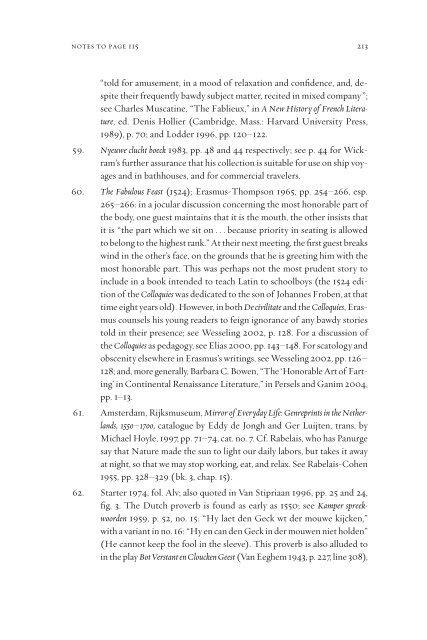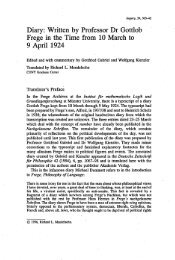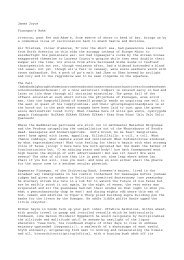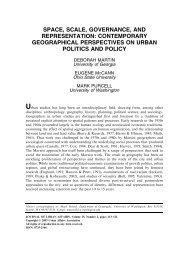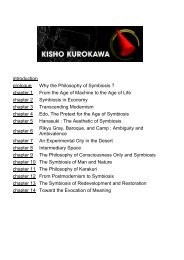Pieter Bruegel and the Art of Laughter - AAAARG.ORG
Pieter Bruegel and the Art of Laughter - AAAARG.ORG
Pieter Bruegel and the Art of Laughter - AAAARG.ORG
You also want an ePaper? Increase the reach of your titles
YUMPU automatically turns print PDFs into web optimized ePapers that Google loves.
notes to page 115 213<br />
“told for amusement, in a mood <strong>of</strong> relaxation <strong>and</strong> confidence, <strong>and</strong>, despite<br />
<strong>the</strong>ir frequently bawdy subject matter, recited in mixed company ”;<br />
see Charles Muscatine, “The Fablieux,” in A New History <strong>of</strong> French Literature,<br />
ed. Denis Hollier (Cambridge, Mass.: Harvard University Press,<br />
1989), p. 70; <strong>and</strong> Lodder 1996, pp. 120–122.<br />
59. Nyeuwe clucht boeck 1983, pp. 48 <strong>and</strong> 44 respectively; see p. 44 for Wickram’s<br />
fur<strong>the</strong>r assurance that his collection is suitable for use on ship voyages<br />
<strong>and</strong> in bathhouses, <strong>and</strong> for commercial travelers.<br />
60. The Fabulous Feast (1524); Erasmus-Thompson 1965, pp. 254–266, esp.<br />
265–266: in a jocular discussion concerning <strong>the</strong> most honorable part <strong>of</strong><br />
<strong>the</strong> body, one guest maintains that it is <strong>the</strong> mouth, <strong>the</strong> o<strong>the</strong>r insists that<br />
it is “<strong>the</strong> part which we sit on . . . because priority in seating is allowed<br />
to belong to <strong>the</strong> highest rank.” At <strong>the</strong>ir next meeting, <strong>the</strong> first guest breaks<br />
wind in <strong>the</strong> o<strong>the</strong>r’s face, on <strong>the</strong> grounds that he is greeting him with <strong>the</strong><br />
most honorable part. This was perhaps not <strong>the</strong> most prudent story to<br />
include in a book intended to teach Latin to schoolboys (<strong>the</strong> 1524 edition<br />
<strong>of</strong> <strong>the</strong> Colloquies was dedicated to <strong>the</strong> son <strong>of</strong> Johannes Froben, at that<br />
time eight years old). However, in both De civilitate <strong>and</strong> <strong>the</strong> Colloquies, Erasmus<br />
counsels his young readers to feign ignorance <strong>of</strong> any bawdy stories<br />
told in <strong>the</strong>ir presence; see Wesseling 2002, p. 128. For a discussion <strong>of</strong><br />
<strong>the</strong> Colloquies as pedagogy, see Elias 2000, pp. 143–148. For scatology <strong>and</strong><br />
obscenity elsewhere in Erasmus’s writings, see Wesseling 2002, pp. 126–<br />
128; <strong>and</strong>, more generally, Barbara C. Bowen, “The ‘Honorable <strong>Art</strong> <strong>of</strong> Farting’<br />
in Continental Renaissance Literature,” in Persels <strong>and</strong> Ganim 2004,<br />
pp. 1–13.<br />
61. Amsterdam, Rijksmuseum, Mirror <strong>of</strong> Everyday Life: Genreprints in <strong>the</strong> Ne<strong>the</strong>rl<strong>and</strong>s,<br />
1550–1700, catalogue by Eddy de Jongh <strong>and</strong> Ger Luijten, trans. by<br />
Michael Hoyle, 1997, pp. 71–74, cat. no. 7. Cf. Rabelais, who has Panurge<br />
say that Nature made <strong>the</strong> sun to light our daily labors, but takes it away<br />
at night, so that we may stop working, eat, <strong>and</strong> relax. See Rabelais-Cohen<br />
1955, pp. 328–329 ( bk. 3, chap. 15).<br />
62. Starter 1974, fol. Alv; also quoted in Van Stipriaan 1996, pp. 25 <strong>and</strong> 24,<br />
fig. 3. The Dutch proverb is found as early as 1550; see Kamper spreekwoorden<br />
1959, p. 52, no. 15: “Hy laet den Geck wt der mouwe kijcken,”<br />
with a variant in no. 16: “Hy en can den Geck in der mouwen niet holden”<br />
(He cannot keep <strong>the</strong> fool in <strong>the</strong> sleeve). This proverb is also alluded to<br />
in <strong>the</strong> play Bot Verstant en Cloucken Geest (Van Eeghem 1943, p. 227, line 308),


